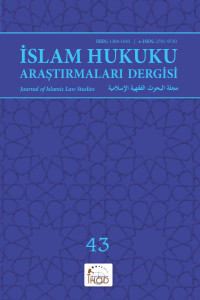Ayhan Ak, İslâm Hukukunun Sabiteleri Kâsânî’ye Göre İcmânın Teorisi ve Pratiği, Samsun: Üniversite Yayınları, 2020, 293 Sayfa, ISBN: 9786054896745
Öz
İcmâ, Hz. Peygamber’den sonra bir devirdeki müçtehitlerin şer’î-amelî bir konunun hükmü üzerinde fikir birliği etmeleri demek olup, fukahânın neredeyse tamamına göre Kur’an ve sünnetten sonra “edille-i şer’îyye”nin üçüncüsüdür. İslâm hukuk sistematiğinde icmâ delilinin temel amacı, sabitleme yani dinin dokunulmazları ve değişmezleri olan sabitelerini ortaya koymak olarak değerlendirilir. Nitekim üzerinde içtihad edilen bir konuda icmâ gerçekleşmiş ise, artık o mesele içtihadî olmaktan çıkmış ve üzerinde hüküm kesinlik boyutuna ulaşmış olup artık o mesele için o dönem zarfında tekrar içtihad yoluna gidilmesi doğru bulunmamaktadır. Bunun sonucunda o mesele için sabite meydana gelmiş ve meseleye ait hüküm tartışmaya kapanmıştır. Bu itibarla bu tür hükümlerin (sabitelerin) tekrar tartışmaya açılması demek, dinin özünün tartışılması demek olacaktır. Müslümanlar için bu denli bağlayıcılığı olan icmâ konusu, İslâm hukukçuları tarafından gösterilen ehemmiyetine binaen titizlikle incelenmiş ve bu konuda çok sayıda eser kaleme alınmıştır. Bu çalışmalardan biri de Ondokuz Mayıs Üniversitesi İlahiyat Fakültesi İslâm Hukuku Anabilim Dalı öğretim üyesi Prof. Dr. Ayhan AK’a ait “İslâm Hukukunun Sâbiteleri Kâsânî’ye Göre İcmanın Teorisi ve Pratiği” adlı kitaptır. Bu yazıda Ayhan AK’ın adı geçen eserinin, alana yaptığı katkı, taşıdığı değer, güçlü ve zayıf yönleri gibi hususları değerlendirilecektir.
Anahtar Kelimeler
Kaynakça
- AK, Ayhan. İslâm Hukukunun Sabiteleri Kâsânî’ye Göre İcmânın Teorisi ve Pratiği. Samsun: Üniversite Yayınları, 2020.
Ayhan Ak, İslâm Hukukunun Sabiteleri Kâsânî’ye Göre İcmânın Teorisi ve Pratiği, Samsun: Üniversite Publications, 2020, 293 Pages, ISBN: 9786054896745
Öz
Ijma means the consensus of the mujtahids following the era of the Prophet Muhammad regarding the rulings on a Shari'i-deed issues, and according to almost all of the fuqaha, it is the third of the "adille-i shar'iyya" after the Qur'an and the Sunnah. In the Islamic legal system, the main purpose of the evidence of ijma is considered as fixation, that is, to reveal the constants of religion, which are inviolable and constants. As, if ijma has been made on a subject on which jurisprudence has been made, that issue has ceased to be jurisprudence and the judgment on it has reached the dimension of finality, and it is no longer considered correct to resort to ijtihad again for that issue during that period. As a result, a fixed has arisen for that matter and the judgment on the matter is closed for discussion. In this respect, the re-discussion of such provisions (constants) would mean a discussion of the essence of religion. The subject of ijma, which is so binding for Muslims, has been meticulously examined by Islamic jurists due to its importance and many works have been written on this subject. One of these studies is the book titled "The Theory and Practice of Ijma According to Kâsânî" by Prof. Dr. Ayhan AK, a faculty member of the Department of Islamic Law, Faculty of Theology, Ondokuz Mayıs University. In this article, Ayhan AK's work will be evaluated such as its contribution to the field, its value, strengths, and weaknesses.
Anahtar Kelimeler
Kaynakça
- AK, Ayhan. İslâm Hukukunun Sabiteleri Kâsânî’ye Göre İcmânın Teorisi ve Pratiği. Samsun: Üniversite Yayınları, 2020.
Ayrıntılar
| Birincil Dil | Türkçe |
|---|---|
| Konular | İslam Hukuku |
| Bölüm | Kitap İncelemeleri |
| Yazarlar | |
| Yayımlanma Tarihi | 30 Haziran 2024 |
| Gönderilme Tarihi | 17 Aralık 2023 |
| Kabul Tarihi | 29 Haziran 2024 |
| Yayımlandığı Sayı | Yıl 2024 Sayı: 43 |



